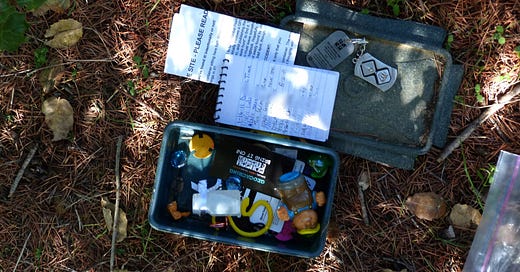I spent most of my years as a youth in Scouting from Tiger to Eagle Scout (In my day, we didn’t have Lion Scouts). So, when I took the challenge of getting two new units started the council needed me to get trained for camping for the Cub Scouts. I thought to myself, “I’m an Eagle Scout. I have the camping merit badge among others—doesn’t this seem a bit redundant?”
Interestingly enough while I did know most of the stuff being taught at the BALOO course, I was introduced to a new Scouting activity that had gained traction since I aged out after earning my Eagle—geocaching! The instructor gave me a GPS device & set me up to find a hidden treasure in the woods (a scout patch for this exercise) and after walking through the woods, I finally found the small cache with my patch—I was hooked! I am currently, so far as I know, the only Geocaching merit badge counselor in the council & two of the scouts in my troop have earned their Geocaching merit badge.
So how exactly did this game (with a huge website geocaching.com) get its start?
Someone interested in the game Geocaching can learn in the Scouts BSA Merit Badge book Geocaching it was May 1, 2000 President Bill Clinton who hadthe U.S. government cease selective availabilityof.the Global Positioning System (GPS) for civilian use.1 Dave Ulmer, a computer consultant and outdoor enthusiast, decided to hide a container—later known as a "cache"—in the woods near Portland, Oregon. He marked the coordinates and posted them on the internet and invited others to find it. This innovative game sparked a global movement for outdoorsmen who began hiding their own caches and sharing their locations online.2
The Boy Scouts of America, recognizing the growing popularity of Geocaching, introduced the Geocaching Merit Badge in 2014. The merit badge allows scouts to learn about the principles of GPS technology, the importance of conservation, and the skills necessary to successfully find and hide geocaches. The requirements for earning the Geocaching Merit Badge focus not only on the technical aspects of navigation and caching but also the importance of safety and outdoor ethics while exploring the outdoors.
The merit badge program encourages scouts to work in teams, fostering community and problem-solving skills as they navigate to hidden caches. It also instills a sense of responsibility for the environment, as scouts learn to practice "cache in, trash out," promoting the idea of leaving natural spaces cleaner than they found them. Leave No Trace.
Naturally, GPS technology has made navigation easier; nonetheless, understanding how to read a map and use a compass remains essential for any outdoorsman. These traditional skills can be invaluable, particularly in areas where GPS signals may be weak or non-existent.
Furthermore, a map provides a comprehensive view of the terrain, including landmarks, elevation changes, and potential hazards. Learning to read a topographic map, such as those produced by the United States Geological Survey (USGS), is crucial for understanding the geography of an area. USGS maps are detailed, reliable, and widely used, making them an excellent resource for both novice and experienced adventurers. Please visit usgs.gov for more information and maps of your surrounding areas. 3
Geocachers using a map and compass allows them to orient themselves in unfamiliar territory. A compass provides a reliable means of determining direction, helping users navigate to their desired location. To effectively use a compass, one must understand the concept of magnetic north, declination, and how to take bearings. By mastering these skills, geocachers can enhance their outdoor experience and ensure they can find their way, even without the aid of technology.
As technology continues to play a significant role in our lives, the importance of traditional navigation skills, such as map reading and compass use, cannot be overstated. By incorporating these skills into the geocaching experience, adventurers can deepen their connection with nature and enhance their outdoor exploration. With resources like the Geoscouting website and the comprehensive maps provided by the USGS, the world of geocaching is rich with opportunities for adventure, learning, and camaraderie.
If you’re involved with Scouting and would like more resources on Geocaching, please visit geoscouting.com. This platform is dedicated to promoting geocaching within the scouting community, offering resources, tips, and tools for scouts to enhance their geocaching experience. The website includes a database of caches specifically designed for scouting events, educational materials related to the Geocaching Merit Badge, and forums where scouts can share their experiences and connect with other geocachers.
Additionally, the Geoscouting website emphasizes the importance of safety and environmental conservation. It provides guidelines for responsible caching, ensuring that scouts understand the impact of their actions on the environment. By fostering a sense of community and collaboration, the Geoscouting website serves as a vital tool for scouts looking to engage in this exciting activity.
Boy Scouts of America. *Geocaching Merit Badge* (BSA, 2014), 7.
Ibid.
Ibid, 73.




